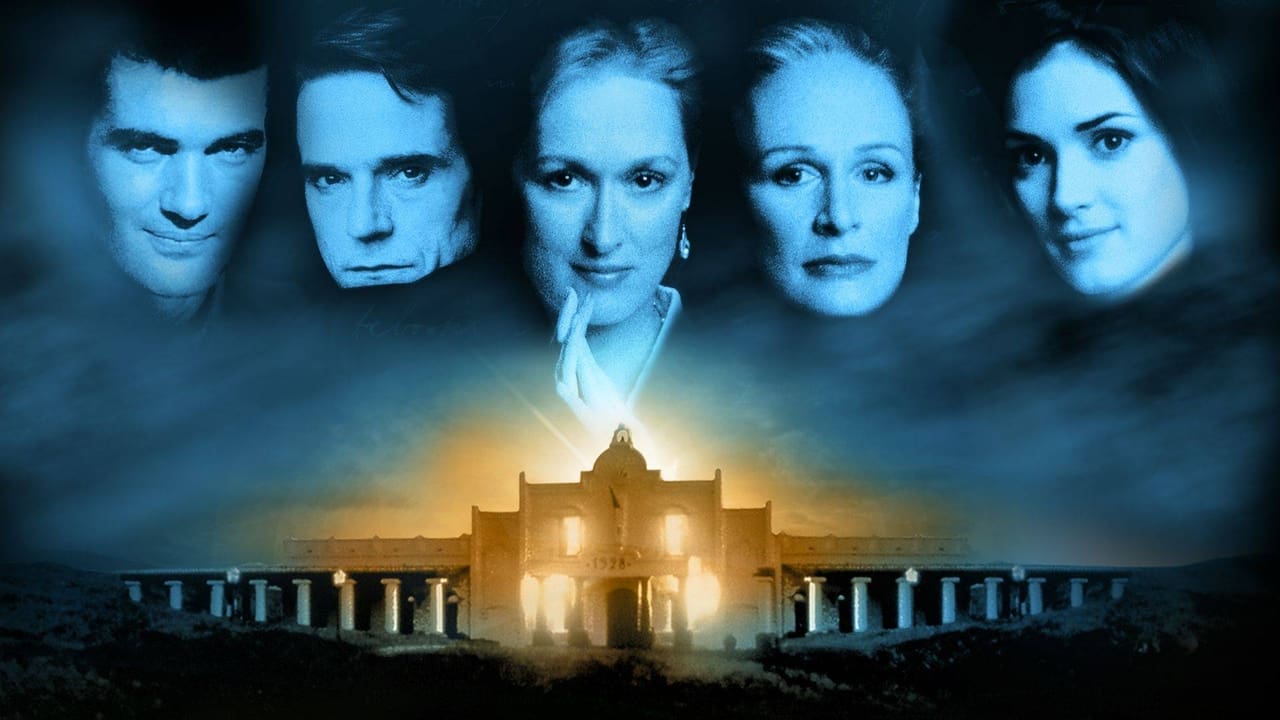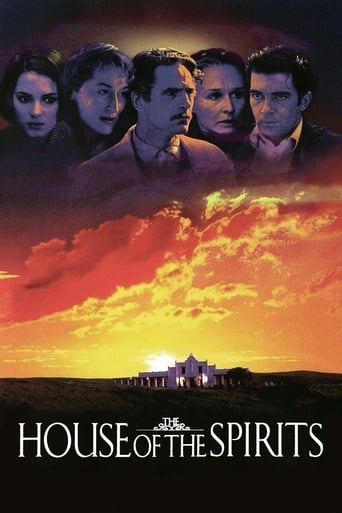

Slow pace in the most part of the movie.
... View MoreGood start, but then it gets ruined
... View MoreA different way of telling a story
... View MoreClever and entertaining enough to recommend even to members of the 1%
... View MoreThe house of the spirits,the movie with no single mistake,I don't think any filmmaker could be more sincere,sensitive,deep and attractive more than the crew members of this film,specially Bille August,Jeremy Irons,Hans Zimmer and all the cast members,in outstanding harmony they gave us the core of all the feelings of Allende's Terrific novel.Watch the movie,mind the difference between the nature of a novel and the nature of a movie and don't make comparisons and then you will find yourself completely taken by this masterpiece,if not then better watch different type of movies
... View MoreThis film is an interesting adaptation of Isabel Allende's best seller by the same name. An interesting story, beautiful landscapes, well developed drama and characters delivered by a great cast. Jeremy Irons excels as Esteban Truebas, the tough and contradictory landowner, and Merryl Streep is a wonderful Clara, light, breezy, spiritual, as the character in the novel. Excellent performance of Glenn Close as well as the sacrificed spinster who cares for her mother while her brother is busy trying to achieve his ambitions. Barely good but certainly not outstanding is Antonio Banderas as Pedro, with excessive "hard handsome macho revolutionary looks" at times. Less fortunate acting by Wynona Ryder, who spoils the character with her overly adolescent posture. The film compacts three generations into two, understandably for the development of characters in a movie. A couple of failed aspects, however. First, the complex Chilean political situation at the time is simplified almost to a family affair, something the book does not pretend to do. The malice of the military establishment seems random, devoid of planning and intelligence, but whoever knows the Chilean history (and his ferocious but cunning leader) is aware it wasn't at all like that. And second, the most important miss in the movie: lack of humor. Precisely the brilliant achievement of Isabel Allende's novel is telling a highly dramatic story with a delightful and ironic humor throughout. Yet the movie moves from one drama into another, with just a few moments of respite (therefore becoming "heavy" and at times hard to swallow), and has practically no humor other than a few scenes at the beginning. A pity, because with such a story and the excellent delivery by the cast it could have been a truly great film.
... View MoreThis is a very strange movie that is hard to be categorized .. A tale about almost everything: 1- True love, and how it can turn over the whole game, how it can change souls, save lives and redeem some people.2- Poverty, oppression and politics .. how most of the time events get so related without us noticing or taking the time to look closer.3- Fate, with all the themes you can imagine, taking place in one movie .. I bet even if you're young, you will feel old by the end of this powerful movie ..4- What really matters in life, the kind of imprint you will want to leave someday, sometimes it's not about being tough or seemingly strong, but rather about knowing love and being gentle ..5- I've never been afraid of death itself, as I have from an unlived life. However, the line said by Clara, "You must not wish for death, that's not important, death will come no matter" is one of the most powerful I've ever heard in my life, and a scene anyone should watch if they ever get hurt enough to want their life to end ..6- And most importantly, it has taught me a lot about unconditional love .. You'll see an oppressor -who has raped a girl and denied a child, almost killed the only man his daughter has ever loved and got rid of his lonely sad sister- loved by a woman that's as beautiful as an angel .. Because that's unconditional love most of us have no knowledge of, because we have a compromised understanding of "common sense", because you love someone as they are with all the demons inside and because, if you look too carefully, you'll know that none of us are angels or demons. We're grey. And we can find ourselves in places we've never dreamt we would put ourselves in, or wake up to find ourselves diverted a lot from the path we've originally chosen.This is a very powerful movie that's highly entertaining and deep, and its depth is measured by how much "you" can get out of it. Regards to all the makers of this beautiful movie which should be one of the top movies ever, especially the amazingly graceful Meryl Streep. Thank you.
... View Morewell, i said it all in the summary, i simpley adore the movie and the cast...i would give each actor an Oscar...great, great movie...i'm 25 now and i watched it 4 times in different periods and i always think i won't cry and i always do, about 2 or 3 times...;) meryl s. was absolutely brilliant, jeremy irons also..just brilliant...i wish the movie received more awards... i really don't know anybody who watched it and didn't loved it... also, glenn close was fantastic... the story was beautiful and sad at the same time... i loved the fact that despite everything clara and esteban loved each other so much, and how blanca was close to her parents...
... View More